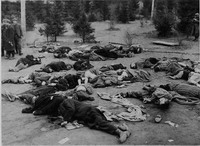Nazi death camp guard challenges deportation order
An accused Nazi death camp guard called the right of the United States' chief immigration judge to order his deportation in question.

The federal government has been trying to deport accused guard John Demjanjuk, 87, for three decades. The 6th U.S. Circuit Court of Appeals heard arguments on Demjanjuk's challenge to a deportation order issued in 2005.
The three-judge panel did not say when it would rule, but it usually takes several months before the court issues a decision.
The arguments revolved around whether an immigration judge had the authority to order Demjanjuk's removal back to his native Ukraine - or Germany or Poland.
"The chief immigration judge is purely an administrative official," Demjanjuk's attorney, John Broadley, told the panel. "The attorney general did not specify that the chief immigration judge was entitled to hear removal cases."
Robert Thomson, for the U.S. Justice Department, told the court that contention was absurd.
"In plain language, the title chief immigration judge means he's a judge," Thomson said. "Why would that be the title if he wasn't to be a judge?"
Demjanjuk, who lives in Ohio, has steadfastly maintained that he was a Nazi prisoner himself, forced to work as a guard, and that he hurt no one.
"You haven't heard the last from us," Demjanjuk's former son-in-law Ed Nishnic said after the hearing. He said that he - and his son and grandson, if necessary - would continue to fight the deportation.
"What has happened to this family is tragedy," said Nishnic, who remains loyal to the family.
He said the family is doing its best to shield Demjanjuk from the controversy.
"He is, in a way, oblivious to what's going on in the courtroom, and we kind of make it that way so he doesn't sit there and worry about this," Nishnic said.
The Justice Department first brought charges seeking to revoke Demjanjuk's citizenship - for allegedly falsifying information on his applications to enter the U.S. in 1952 and to become a citizen in 1958 - and to deport him in 1977.
Demjanjuk's U.S. citizenship was revoked in 1981, restored in 1998 and revoked again in 2002. The government initially claimed he was the notoriously sadistic guard at the Treblinka camp known as "Ivan the Terrible."
He was extradited to Israel in 1986 and was under a death sentence, until Israel's Supreme Court ruled in 1993 that he was not the same man as the guard known as Ivan.
Demjanjuk returned home and his U.S. citizenship was restored. The current deportation case is based on evidence uncovered by the Justice Department alleging he was a different guard. That evidence led courts to again strip Demjanjuk of his citizenship - on the basis of the original falsified information charge.
In the current case, Broadley and the government are arguing over whether a former chief immigration judge, Michael Creppy, had authority to rule in 2005 that Demjanjuk could be deported.
Broadley contends that Creppy was an administrator who should have appointed an immigration judge to hear the case, rather than handle it himself. He wants the deportation order tossed out and a new hearing held.
The Board of Immigration Appeals has refused to set aside Creppy's ruling, and Broadley wants the 6th Circuit to review that denial.
Subscribe to Pravda.Ru Telegram channel, Facebook, RSS!


